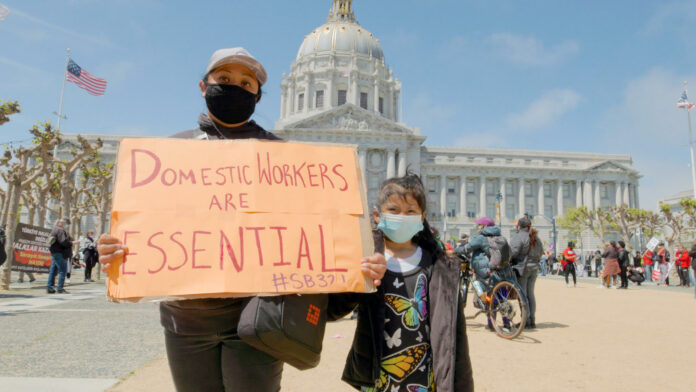The short film, “Dignidad,” offers a look at the struggle of domestic workers during the COVID-19 pandemic
By SYDNEY AMESTOY — campus@theaggie.org
The UC Davis Environmental Health Sciences Center (EHSC) has released a new documentary, “Dignidad,” which aired on local PBS stations on Jan. 14.
“Dignidad” covers the steps domestic workers across the country took to gain protections such as health insurance coverage and paid sick leave during the COVID-19 pandemic, according to a press release from EHSC written by producer Jennifer Biddle.
“Domestic workers in California were three times as likely to get COVID-19 compared with the state’s general population, according to research at UC Davis,” the release said.
This is the second documentary EHCS has helped produce, the first being Emmy-nominated “Waking Up to Wildfires,” which was released in 2019 and also aired on PBS. That documentary covered the survivors of the 2017 North Bay wildfires.
Paige Bierma, a filmmaker from San Francisco, directed both documentaries. EHCS approached her with the idea for “Dignidad,” according to Bierma.
“It was incredibly inspiring to work on this film with so many brave domestic workers and especially interesting to be able to capture the ups and downs of a grassroots political movement during the uncertain times of a pandemic,” Bierma said.
Bierma went on to provide more context relevant to the film, explaining how worker protection laws have changed over time and how they haven’t.
“In the 1930s, when the U.S. passed its first fair labor and worker protection laws, domestic workers and farm workers were the only two groups explicitly excluded from the laws,” Bierma said. “That was in large part because those workers at the time were mostly African-American. Today, a majority of domestic workers are women of color, and their legal rights and protections are still well below those of white males in this country.”
The research conducted for the documentary was a collaborative effort between the EHCS and the California Domestic Workers Coalition (CDWC). Jasmine Garcia Montes, a researcher for EHCS, said that she was involved in facilitating the collaboration, partially through her work translating the researchers’ survey into Spanish and Tagalog.
“The survey began to examine the prevalence of access to personal protective equipment for frontline workers in essential jobs, or [those] whose work puts them regularly within six feet of others, and evaluate financial hardship among workers and their families whether laid off, working remotely or on the frontlines,” Garcia Montes said. “Then it was tailored to focus on questions that pertained specifically to domestic workers.”
The survey was released nationwide in September 2020 and concluded in April 2021, according to Garcia Montes.
“The COVID-19 Survey for Workers collected data from 164 domestic workers before widespread vaccination or the emergence of the Delta variant in the United States,” Garcia Montes said. “Most domestic workers interviewed for this research project were Hispanic women who worked as house cleaners, nannies and home attendants for seniors and people with disabilities.”
The survey was not the only research conducted for the documentary, according to Bierma. Lots of historical background information needed to be recovered by the EHCS team and the filmmaking crew, as well as finding domestic workers willing to be interviewed.
“For the documentary, the producer Jennifer Biddle and I read many articles and reports on the history and current state of legal rights and protections for domestic workers,” Bierma said. “EHSC intern Kyle Kreuger researched and tracked California legislation on the subject, [and] the CDWC also put me in contact with many of their members and member organizations in order to meet and select the people we ended up profiling in the film.”
Bierma offered some concluding thoughts, reflecting on what she hopes viewers take away from the documentary.
“I hope this film helps to show the real-life results of these disparities [against domestic workers], as well as the kind of dedication and perseverance it takes to bring about real political change in this country,” Bierma said.
The 27-minute documentary aired on local PBS stations on Jan. 14, and is available to watch for free on the PBS website.
Written by: Sydney Amestoy — campus@theaggie.org




